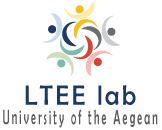Science Technology Engineering Arts Mathematics (STEAM) dimensions in Education
LTEE laboratory contribute to the STEAM Education direction, through constructionist learning activities and an epistemologically grounded interdisciplinary framework, via specifically designed research projects as well as inspiring short-term projects in the frame of post and undergraduate studies.
Some indicative publications, regarding finished related works, are the followings:
[They concern: Coding, computational thinking dimensions, educational robotics, physical computing, computer science education, interdisciplinary approach]
- Fessakis, G., Komis, V., Mavroudi, E., Prantsoudi, S. (In Press 2018). Exploring the scope and the conceptualization of Computational Thinking at the K-12 classroom level curriculum, In M.S. Khine (Ed.)(in press). Computational Thinking in the STEM Disciplines: Foundations and Research Highlights. Switzerland: Springer
- Fessakis, G., Mavroudi, E., Prantsoudi, S. (2017). Current conception of Computational Thinking at the K-12 classroom level curriculum, Poster presented at ISSEP 2017, 13-15 NOV 2017, Un. of Helsinki, Finland,
- Georgios Fessakis and Efstathia Kirodimou (2016). Improving the teachers’ understanding of complex systems through dynamic systems modelling and problem solving. HMS – International Journal Mathematics Education, Volume 7. 2015 – 2016 (59-92)
- Fesakis G., Mavroudi E., Prantsoudi St., (2016). Current trends and issues for coding in preschool and primary education, In Proceedings of the 8th Pan-hellenic Conference “Informatics Didactics”, Ioannina, 23-25/9/2016, p. 33-41
- Mavroudi, E., Petrou, Ar., Fessakis, G., (2014). Computational Thinking: Conceptual development, international initiatives and programs of studies, in Proceedings of 7th Pan-Hellenic Conference “Computer Science Education”, University of Crete, Rethymno, 3-5/10/2014, pp.: 110-120
- Fessakis, G., Gouli, E., & Mavroudi, E., (2013). Problem solving by 5–6 years old kindergarten children in a computer programming environment: A case study. Computers & Education, 63, 87–97.
- Fessakis, G., Kladogenis, D., Markouzis, D., (2012). Training mixed groups of teachers and students in educational robotics using the studio pedagogical model, In C., Kynigos, J., Clayson, & N., Yiannoutsou (eds.), Proceedings of CONSTRUCTIONISM 2012 Conf., August 21-25, Athens, Greece. pp.: 260-269
- Fessakis G., Tasoula E., (2006). Design of a computer controlled robotic device for the construction of mathematical and spatial concepts for preschoolers. “Astrolavos” Journal of Greek Mathematical Society, Vol 6, July-December 2006, pp. 33-54
Accomplished Master Degree Thesis:
- Κaltekis, G. & Stati F. (2018). Interdisciplinary approaches of educational robotics and STEM. Study with Rude Goldberg Machines & Robotics Technology., Master of Education Thesis, Supervisor, Ass. Professor, G. Fessakis, MEd Didactics of Mathematics, Science and ICTs in Education: Interdisciplinary Approach, University of the Aegean.
